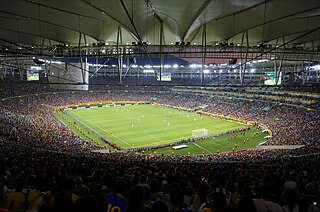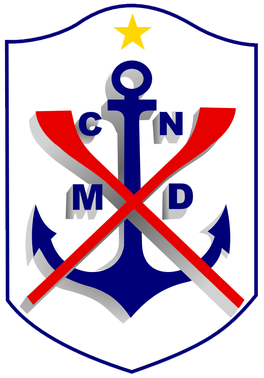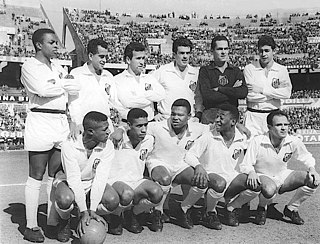
Football is the most popular sport in Brazil and a prominent part of the country's national identity. The Brazil national football team has won the FIFA World Cup five times, the most of any team, in 1958, 1962, 1970, 1994 and 2002. Brazil and Germany are the only teams to succeed in qualifying for all the World Cups for which they entered the qualifiers; Brazil is the only team to participate in every World Cup competition ever held. Brazil has also won an Olympic gold medal, at the 2016 Summer Olympics held in Rio de Janeiro and at the 2020 Summer Olympics in Tokyo.
The Torneio Roberto Gomes Pedrosa, also known as Taça de Prata, or nicknamed Robertão, was an association football competition contested in Brazil between 1967 and 1970 among soccer teams from São Paulo, Rio de Janeiro, Rio Grande do Sul, Minas Gerais and Paraná states. It was an important soccer tournament, being considered a predecessor to the Brazilian Championship induced in 1971. Thus in 2010 the Brazilian Football Confederation decided to consider the winners of the Robertão as Brazilian champions. The 1st edition of the tournament was organized by Federação de Futebol do Estado do Rio de Janeiro and Federação Paulista de Futebol.

America Football Club, usually abbreviated to America-RJ or simply America, is a Brazilian football team based in the city of Rio de Janeiro, in the northern neighborhood of Tijuca. The team compete in Campeonato Carioca, the top tier of the Rio de Janeiro state football league.

The Torneio Rio – São Paulo was a traditional Brazilian football competition contested between São Paulo and Rio de Janeiro teams from 1933 to 1966, in 1993 and from 1997 to 2002.
The Triple Crown of Brazilian Football is an unofficial title given to the club that won the three most important competitions of the Brazilian football in the same year:
The Campeonato Brasileiro de Futebol Feminino, also known as Brasileirão Feminino, is an annual Brazilian women's club football tournament organized by the Confederação Brasileira de Futebol, or CBF. It is the country's premier women's football competition and the first professional women's league in the country.
The 1971 Campeonato Brasileiro Série A was the first official Brazilian football championship, and 15th edition overall of the Série A following the Taça Brasil and Torneio Roberto Gomes Pedrosa tournaments. Organized by the Brazilian Confederation of Sports (CBD), it was won by Atlético Mineiro.

The Campeonato Brasileiro Série A, commonly referred to as the Brasileirão, and also known as Brasileirão Assaí due to sponsorship with Assaí Atacadista, is a Brazilian professional league for men's football clubs. At the top of the Brazilian football league system, it is the country's primary football competition. Contested by 20 clubs, it operates on a system of promotion and relegation with the Campeonato Brasileiro Série B. In 2021, the competition was chosen by the IFFHS as the strongest national league in South America as well as the strongest in the world.

The Campeonato Brasileiro Série B is the second tier of the Brazilian football league system. Although not having been played annually since its founding in 1971, the competition format has changed almost every season. Since 2006 it has been contested by 20 teams in a double round-robin format with the top four teams being promoted to the Campeonato Brasileiro Série A group and the bottom four teams being relegated to the Campeonato Brasileiro Série C group.

Clube Náutico Marcílio Dias, known simply as Marcílio Dias, is a Brazilian football club from Itajaí, Santa Catarina state. The club plays its home matches at Hercílio Luz and competed in Copa João Havelange in 2000, in the Campeonato Brasileiro Série B in 1989, in the Campeonato Brasileiro Série C in 1988, 1995, 2001, 2003, 2005 and 2006. The club won the Recopa Sul-Brasileira in 2007, the state championship in 1963, and the state cup in 2007.

The Choque-Rei is the name given to Palmeiras and São Paulo football rivalry matches. It is contested between two very big, classic football clubs. The derby dates back to 1930. The tension between both clubs and fanbases is extremely fierce, and it is considered the one of the biggest derbies in the city of São Paulo.

Os Santásticos is the nickname for the group of Santos Futebol Clube players coached by Lula and Antoninho that won a total of 25 titles between 1959 and 1974, including two Copa Libertadores. Often considered one of the strongest teams ever assembled in any sport, scoring over 3000 goals during this period, with an average of over 2.5 goals per match.
The Campeonato da Região Sul-Fronteira, commonly known as the Copa Sul-Fronteira, is an annual competition organized by the Rio Grande do Sul state football federation for clubs that are in the first, second and third divisions of the Campeonato Gaúcho and are located in the southern half of the state. It is held in the second half of the year and usually clubs participating in the higher levels of the Campeonato Brasileiro do not participate with the first team squad, using his academy.

São Paulo Futebol Clube, commonly known as São Paulo, is a professional women's association football club based in São Paulo, Brazil. Founded in 1997, the team is affiliated with Federação Paulista de Futebol and play their home games at Estádio do Morumbi. The team colors, reflected in their logo and uniform, are white, red and black. They play in the top tier of women's football in Brazil, the Campeonato Brasileiro de Futebol Feminino, and in the Campeonato Paulista de Futebol Feminino, the first division of the traditional in-state competition.
The Taça dos Campeões Estaduais Rio – São Paulo or simply known Taça dos Campões Estaduais, was a tournament that promoted the clash between the champions of São Paulo state league and Rio de Janeiro state league.
The Torneio Heleno Nunes, was an interstate football competition organized by the Federação Paulista de Futebol (FPF) and with the official seal of the Confederação Brasileira de Futebol (CBF), which had the participation of 10 invited teams, which had not qualified for the third phase of the 1984 Campeonato Brasileiro Série A, eight coming from the Series A and two coming from the 1984 Campeonato Brasileiro Série B. The name of tournament was in honor of Heleno de Barros Nunes, former president of CBD and CBF, being the leader in the transition phase from one to the other (1979), who died on March 3, 1984.
The 2002 Torneio Rio São Paulo was the 26th and the last edition disputed of the Torneio Rio-São Paulo. It was the edition with the most participants involved, and it was expected to be at the top of the pyramid of Campeonato Paulista and Campeonato Carioca.








